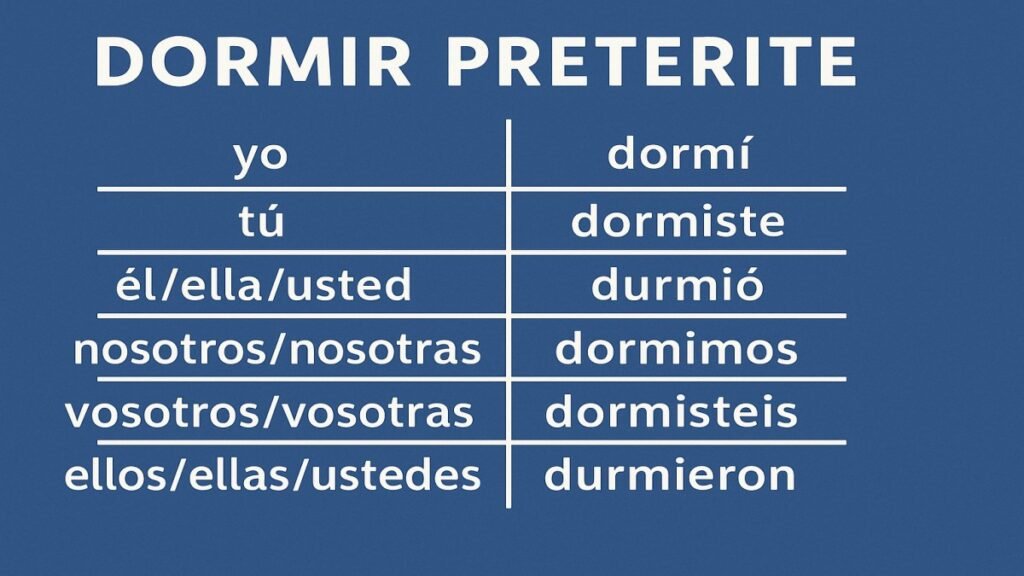Learning Spanish can feel like navigating a jungle of verb tenses and conjugations. One of those trickier verbs is “dormir,” which means “to sleep.” If you’ve ever found yourself confused about how to use “dormir” in the preterite tense—don’t worry. You’re in the right place.
Let’s break it all down so it finally makes sense (and sticks).
What Does “Dormir” Mean in Spanish?
At its core, “dormir” simply means “to sleep.” You use it in the same way you’d use “sleep” in English.
- Yo duermo mucho. (I sleep a lot.)
- ¿Tú duermes bien? (Do you sleep well?)
But when talking about past actions, you need to conjugate it correctly in the preterite tense. And that’s where things get interesting.
Overview of Spanish Verb Tenses
Why Verb Tense Matters
In Spanish, verb tense tells the story. It lets you know when something happened: past, present, or future.
If you say “Yo duermo” vs. “Yo dormí,” you’re talking about now versus what already happened.
Preterite vs. Imperfect
Both are past tenses, but:
- Preterite = completed actions
- Imperfect = ongoing or habitual actions in the past
So if you want to say “I slept eight hours last night,” that’s a one-time thing → use preterite.
The Basics of the Preterite Tense
When to Use the Preterite Tense
- To talk about something that started and ended at a specific time
- Events that happened once or a specific number of times
Example:
Ayer dormí temprano. (Yesterday I slept early.)
Regular vs. Irregular Verbs in the Preterite
Many verbs are regular (they follow standard patterns), but verbs like dormir throw a curveball. They’re mostly regular but with a twist—a stem change.
Is “Dormir” Regular or Irregular in the Preterite?
Dormir is an -IR verb, and while it’s mostly regular, it has a stem change in the third person.
This makes it semi-irregular. You’ll see the stem change from “o” to “u” in él/ella/usted and ellos/ellas/ustedes forms.
Conjugation Chart of “Dormir” in the Preterite Tense
Let’s look at how “dormir” is conjugated in the preterite:
Singular Forms
- Yo dormí – I slept
- Tú dormiste – You slept
- Él/Ella/Usted durmió – He/She/You (formal) slept
Plural Forms
- Nosotros dormimos – We slept
- Vosotros dormisteis – You all slept (Spain only)
- Ellos/Ellas/Ustedes durmieron – They/You all slept
Notice the stem change in durmió and durmieron? That’s the key difference!
Spelling Changes in the Preterite
For most -IR verbs, stem changes only happen in él/ella/usted and ellos/ellas/ustedes. This is true for dormir, too.
So, it’s dormí, dormiste, then boom—durmió (not dormió!).
Stem Changes for “Dormir”
What Changes and Why
The verb dormir changes from “o” to “u” in the third person. This happens for phonetic reasons and follows patterns of many other -IR stem-changing verbs.
Dormir as a Stem-Changing -IR Verb
Here are other verbs with similar changes:
- Morir → murió
- Sentir → sintió
- Preferir → prefirió
Once you learn the pattern, they become predictable.
Common Examples of “Dormir” in the Preterite
- Anoche dormí ocho horas.
(Last night I slept eight hours.) - ¿Durmió bien tu hermano?
(Did your brother sleep well?) - Los niños durmieron en el coche.
(The kids slept in the car.)
Dormir in Context – Real-Life Scenarios
Using Dormir in Conversations
Whether you’re chatting with a friend or telling a story, dormir is super common:
- “No dormí nada anoche.” → I didn’t sleep at all last night.
- “Durmieron en el sofá después de la fiesta.” → They slept on the couch after the party.
Writing with Dormir
You’ll see it in books, texts, and even in your Spanish exams. Mastering it means you sound natural and fluent.
Common Mistakes Learners Make with “Dormir”
- Saying dormió instead of durmió
- Forgetting the stem change in 3rd person
- Mixing up preterite with imperfect (e.g., dormía vs. dormí)
Conclusion
Mastering “dormir” in the preterite isn’t as daunting as it seems. Once you understand the pattern and stem change, it starts to click. Whether you’re telling someone how well you slept or writing a past-tense story in Spanish class, this verb is your go-to. Just remember—durmió and durmieron are your stem-changers, and you’ll be ahead of the game!
FAQs
1. Is “dormir” a regular verb in the preterite?
Not exactly. It’s mostly regular but has a stem change (o → u) in the third-person forms.
2. What’s the difference between “dormir” and “dormirse”?
“Dormir” means “to sleep,” while “dormirse” means “to fall asleep.”
3. How do you say “They slept well” in Spanish?
Durmieron bien.
4. Why does “dormir” change to “durmió” in the preterite?
It’s a stem-changing -IR verb. These verbs change vowels in the 3rd person for pronunciation.
5. How can I memorize “dormir” conjugations faster?
Use repetition, flashcards, and speak the forms aloud. Create sentences about your sleep habits!








